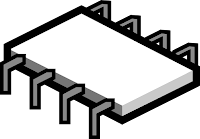Q: Write an ALP to find out the mean, variance and standard deviation for a given set of numbers.
 Floating point instruction seem to be pretty hard to grasp, especially if you are using them for the first time. While coding a solution to this problem, often I found myself opening the Intel ia64 manual confused about the end result of an instruction. Thus I decided to comment the code in detail ,so that readers don't find themselves in a similar situation.
Floating point instruction seem to be pretty hard to grasp, especially if you are using them for the first time. While coding a solution to this problem, often I found myself opening the Intel ia64 manual confused about the end result of an instruction. Thus I decided to comment the code in detail ,so that readers don't find themselves in a similar situation.
In case you need to refer to the manual here's the link:-
instruction-set-reference-manual
OS:-Linux-64 bit(Ubuntu 14.04 LTS)
r00t@comp:~$ nasm -f elf64 as7.asm
r00t@comp:~$ ld -o as7 as7.o
r00t@comp:~$ ./as7
The mean is 0000000000000017.3333
The variance is 0000000000000134.2222
The standard deviance is 0000000000000011.5854
 Floating point instruction seem to be pretty hard to grasp, especially if you are using them for the first time. While coding a solution to this problem, often I found myself opening the Intel ia64 manual confused about the end result of an instruction. Thus I decided to comment the code in detail ,so that readers don't find themselves in a similar situation.
Floating point instruction seem to be pretty hard to grasp, especially if you are using them for the first time. While coding a solution to this problem, often I found myself opening the Intel ia64 manual confused about the end result of an instruction. Thus I decided to comment the code in detail ,so that readers don't find themselves in a similar situation.In case you need to refer to the manual here's the link:-
instruction-set-reference-manual
Code:
Assembler:- NASMOS:-Linux-64 bit(Ubuntu 14.04 LTS)
;Author:-Abhishek Munagekar@Programing Wonders ;blog:- www.prgwonders.blogspot.in ;fb :-www.facebook.com/prgwonders ;Title :-Floating Point Operations ;+++++++++++++++++++++++++++++++++++++ %macro print 2 mov rax,01 mov rdi,0 mov rsi,%1 mov rdx,%2 syscall %endmacro %macro read 2 mov rax,0 mov rdi,1 mov rsi,%1 mov rdx,%2 syscall %endmacro ;++++++++++++++++++++++++++++++++++++++ section .data msg1 : db 10,"The mean is ", len1 :equ $-msg1 msg2: db 10,"The variance is ", len2 :equ $-msg2 msg3: db 10,"The standard deviance is ", len3: equ $-msg3 data: dd 2.0,20.0,30.0 dcpt: db "." precision dw 10000 ;used for making the precision 4 points after decimal section .bss count2 resw 1 ;additional counter count resw 1 ;counter h2acount resb 1 bcd rest 1 ;to store bcd obtained for the printing of results mean resd 1 ;required for calculating the variance dbuff resw 1 ;used for storing byte in ascii section .text global _start: _start: finit ;initialize the math-coprocessor fldz ;push 0.0 onto fpu stack mov r8,data ;set r8 to point the begining of the data array mov r9,0 mov word[count],3h ;initialize the counter addloop: fadd dword[r8] add r8,4 dec word[count] jnz addloop mov word[count],3 ;the sum is now at stack 0 fidiv word[count] fst dword[mean] ;mean is now obtained and stored print msg1,len1 call s0printer ;mean is now printed proceding for variance ;load st0 with 0.0 mov r8,data mov word[count2],3 fldz ;stack initialization remove this line and see fldz ;what happens spent hours debugging this varloop: fldz ;cumulative answer at st1 fld dword[r8] ;cumulative answer at st2 fsub dword[mean] ;st0=x-mean,st1=0;st2=cumulative answer here fst st1 ;st1=st0 fmulp st1,st0 ;st0=(x-mean)^2,st1=cumulative answer fadd ;st0=cumulative answer add r8,4 dec word[count2] jnz varloop mov word[count2],3 fidiv word[count2] fst st1 ;storing variance value here for std deviation print msg2,len2 call s0printer fsqrt ;using the earliear stored value print msg3,len3 call s0printer exiter: mov rax,60 mov rdi,0h syscall s0printer: fimul word[precision] fbstp tword[bcd] ;store bcd integer and pop mov word[count],8h mov r8,bcd add r8,9 ;go to last byte of answer printloop: mov al,byte[r8] call h2a print dbuff,2 dec r8 dec word[count] jnz printloop print dcpt,1 ;print the decimal point now mov byte[count],2 printloop2: mov al,byte[r8] call h2a print dbuff,2 dec r8 dec word[count] jnz printloop2 ret h2a: ;hex to ascii,value at al, output at display buff mov r11,dbuff ;used to point at the base of dbuff mov byte[h2acount],2 mov bl,0h h2aloop: rol al,4 mov bl,al and bl,0Fh cmp bl,9h jbe nocorrection add bl,7h nocorrection: add bl,30h mov byte[r11],bl inc r11 dec byte[h2acount] jnz h2aloop ret
Output
r00t@comp:~$ nasm -f elf64 as7.asm
r00t@comp:~$ ld -o as7 as7.o
r00t@comp:~$ ./as7
The mean is 0000000000000017.3333
The variance is 0000000000000134.2222
The standard deviance is 0000000000000011.5854

No comments:
Post a Comment